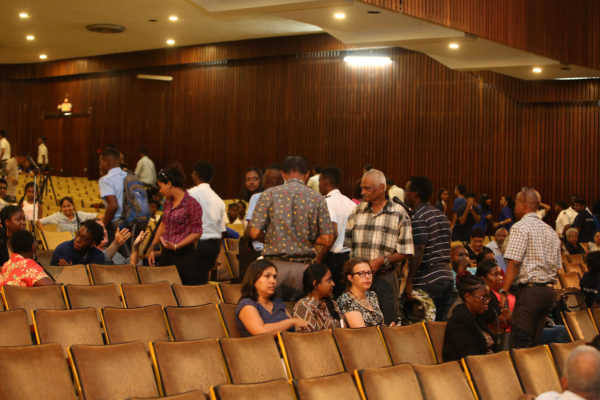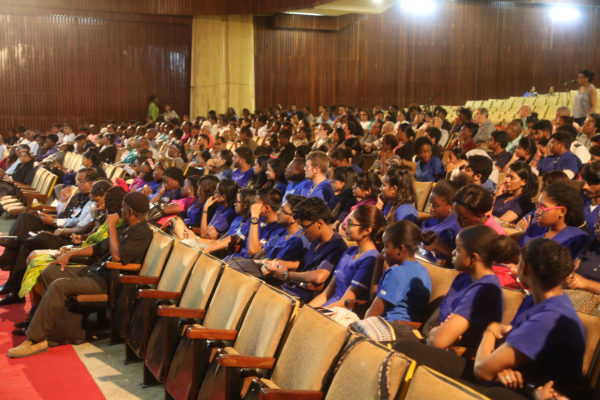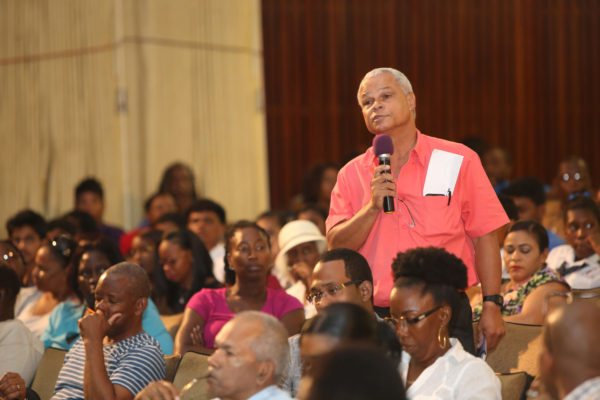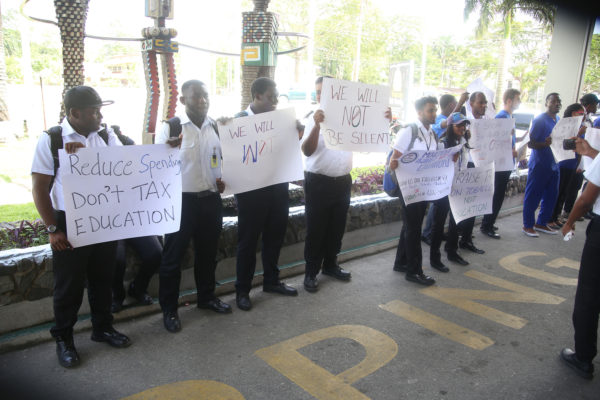By Thandeka Percival and Dreylan Johnson
There is unlikely to be any change this year to the 14% Value Added Tax (VAT) being applied on private school tuition fees, according to Prime Minister Moses Nagamootoo, who made the position clear yesterday when government ministers engaged stakeholders in a discussion on the measure at the National Cultural Centre.
“The 14% VAT will be reviewed. I say this: the 14% tax will be reviewed, as well as other taxes but whether it can be reviewed for 2017, I cannot say that definitively. I can say that 2018 is a possibility, so I can take your recommendation to Cabinet and hope that Cabinet can pronounce on your representation and that a decision should be announced soon,” Nagamootoo told a crowd of private school owners, teachers, students and their parents.
Those gathered had spent nearly three hours providing reasons why the measure should be revoked and did not welcome the PM’s statement. Many began walking out even before he could complete it.
Private education became subject to VAT on February 1, following the removal of zero-rated items as a measure of the 2017 national budget. Since its implementation, there has been public outcry against the measure, including protests organised by the Guyana Private Schools United.
Throughout the nearly three-hour engagement, Minister of Public Telecommunications Cathy Hughes had assured those gathered that their concerns would be taken to next week’s Cabinet meeting for an open-minded review, after which a specific position would be clearly communicated.
Hughes, in the face of several impassioned presentations, sought to convince stakeholders that their concerns were being heard, recorded and were likely to inspire positive action. However, by the end of the engagement there was not a lot of optimism left.
Minister of Education Dr Rupert Roopnaraine opened the engagement by assuring stakeholders that government was committed to improving the education system. Referencing President David Granger’s ‘Education Nation’ presentation, he spoke of the $43.1 billion or 17.2% of the national budget allocated to the sector in 2017 and waxed eloquently about spending on school feeding and school uniform programmes as well as construction, expansion and renovation of schools, dormitories and other buildings.
The subject minister also took the time to reference the earnings of private schools and stated that many of them charge between $144,000 and $300,000 per academic year and the top eight earners rake in more than $2 billion a year in tuition fees. This, he said, showed the ability of many private schools to absorb the tax without passing it on to students and parents, and he added that some of them were not paying their fair share of taxes either by inflating expenditure and under-declaration of income.
This position was not welcomed by the gathering, with immediate past President of the Georgetown Chamber of Commerce and Industry (GCCI) Vishnu Doerga declaring that no business can absorb VAT.
“VAT is not an expense. It is a consumer tax. We have to stop mentioning that we can absorb VAT because that would be illegal based on our VAT Act. No business can absorb VAT, because it is a consumer tax,” Doerga said. He called on government to stop making the legitimate private sector the enemy. Many of the new tax measures, he argued, are supporting illegitimate business, since it is only those who are already paying taxes who will continue to do so until the Guyana Revenue Authority begins to better enforce regulations. Until such time, legitimate businesses are being pushed into the corner, a state of affairs which could lead to the destruction of the private sector, he stated
Accountant Christopher Ram also called out the government on its continued to request for the private schools to absorb VAT.
According to Ram, government is asking the schools to accept a 12.28% cut in their gross revenue when government is not prepared to accept less than a quarter percent (0.25%) of a cut in its tax revenue.
He urged that a better option for earning needed tax revenue is to pursue those entities, including private schools, which are evading taxes.
“There are laws to deal with those persons and those laws must be implemented. There should be no reason, therefore, no reason that tax not paid by schools should be charged to the consumer,” he told the ministers gathered.
University of Guyana Lecturer Dr Mellissa Ifill, contributing to the debate as a parent, told the ministers that her research has shown that while other Caribbean and South American countries also have a private and public model of the education system, none of them have a system where private tuition is taxed. Instead, in several territories, governments provide tax exemptions and even go so far as to pay the salaries of teachers working in private schools because they recognise that the sector is providing a necessary service.
She assured those gathered that her opposition to this measure will not end until its revocation.
‘Blood, sweat and tears’
Meanwhile, emotions ran high among the participants of the forum, especially among students, who rose at the opportunity to air their personal grievances during the open segment.
Jonathan Yearwood, a business student at a private institution, was the first to take up the mantle as far as student representation was concerned in the forum.
Yearwood delivered an emotional speech, where he highlighted his background, and the struggle he endured to finally arrive at the point where pursuing a graduate degree became not only a possibility, but a reality, after completing his first degree in 2004.
“It has taken me 12 years—12 further years—to be able to afford to go to a graduate school to get a graduate degree, which I am presently pursuing. Mine is not an easy story. I work hard. I save. I try to get what I need through blood, sweat and tears. Now, here I am in a private school doing a graduate degree and there you are—my government that says it’s a good life for all—you would have just increased my fees by 14%,” he said, before noting that the implementation of VAT constitutes a cost of $7,700 added to his tuition fee per month.
Yearwood said that having a miniscule disposable income, and already being confined to a budget, the tax addition means that he will have to re-budget to cater for the added expense. He said he was positive there are other students like him facing the same ordeal.
“I am asking you from the bottom of my heart. I’m not asking, I’m begging—and I don’t beg for anything, I work for everything—I am begging you that your government, my government, Guyana’s government, see fit to revoke this tax on VAT on education,” Yearwood pleaded.
Jumoye Caleb, a Jamaican national studying Aeronautical Engineering at the Art Williams and Harry Wendt Aeronautical Engineering School, was just one of several students, both foreign and local, who spoke of the sacrifices they had had to make to pursue a degree in the specialised fields of engineering and medicine.
Caleb related to the forum that he had traveled to Guyana to attend the school but being financially incapable of doing such, he was delayed a year, while he worked to afford the tuition.
“…I had to work at a funeral home. Now, for me to work at a funeral home six days a week seeing dead people for six days a week, more than 10 dead every single day, this is to show how much I really want to go to the school and how much I need progress in my life,” the young man stated.
The medical fraternity was well represented as several students from various local private medical schools stood to ask questions and raise concerns. Many were unclear on how the tax would be applied and sought clarifications on its implication for foreign students. They expressed worry at the possibility that any additional financial burden would cost them their career opportunity.
Attendee Melanie Nokta spoke on the negative impact VAT on tuition fees would have on students studying in the hinterland regions, which she noted are already underserviced. Nokta opened her speech by stating that she wanted to “address the misconception that private schools are only for rich people,” and noted too that often families in those regions can barely afford the cost, but have little choice.
“The reality is if you are from the hinterland you send your children to Georgetown in private school, which means you are also going to have to bear the burden of transport, of housing, and of a caregiver, because very often parents are not able to travel with their children. The other option, if you’re in the Rupununi for instance, is you send your children abroad to Brazil. That means that all their accreditation is Portuguese and it is very unlikely that they are coming back to Guyana to contribute,” she said.
Although it was promised that the concerns raised and questions posed by those who attended the forum would be addressed by the Minister of Education, this never came to be.
Instead, Nagamootoo took to the podium following the open segment to deliver a few key points, successfully clearing the auditorium by the time his speech was through when he essentially stated that there was nothing the government could do this year regarding the tax.
After the meeting, Director of School of the Nations Dr Brian O’Toole said that if the thoughts expressed by the Prime Minister were in fact the position of the government, that should have made clear from the beginning “so people could see are they using their time well or are they wasting their time.”
He stated that he believed all the points put forward by those against the VAT implementation were “articulate,” “accurate,” “without emotion,” “without anger,” and “with no political agenda,” but added that the rebuttal provided was not quite as clear. He stated too that “not one issue that was presented was debated by the head table.”
“I do [think it was a useful venture] because I think we put forward our points very, very well. I leave personally happy with the way we have presented our arguments. Now, either it will lead to tremendous disillusionment, more cynicism, more young people saying they’ve given up with any political interests whatsoever, or it will be an honest examination on their part—on Cabinet—to say “it’s a mistake, we didn’t think this through, we didn’t realise the hardships this would cause and we will change it now,” O’Toole offered.
Ram, following the forum, said he was optimistic about the engagement, stating that he believed the right decision will be made after analysis.
“It’s the first time we’ve had this kind of exchange. I particularly like the way Minister Roopnaraine listened. I think the Prime Minister Moses Nagamootoo did his job very well, he has to defend government policy but I also believe the government as a collective will have listened today and as I said, I am pretty optimistic,” Ram said.














